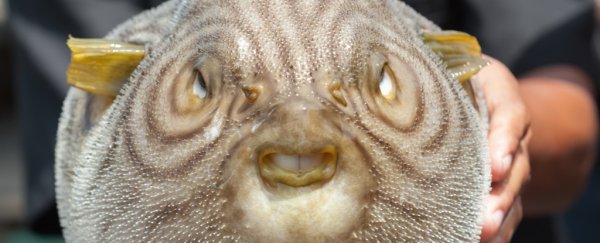Health authorities in the Japanese city of Gamagori were forced to activate an emergency warning system on Monday after a local supermarket accidentally sold five packages of potentially deadly pufferfish to customers.
The fish, called fugu in Japan, is prized as a delicacy, but has also been dubbed the 'Russian roulette' of dining because it contains a dangerous poison called tetrodotoxin, the consumption of which can be fatal to humans.
In fact, at least 10 Japanese people have died since 2006 from eating the toxic fish, and it used to be far worse – fugu's death toll peaked in 1958 with a stunning 176 victims, when awareness of the dangers was lower.
Since then, fugu chefs have to undergo a rigorous three-year apprenticeship in order to get a licence to serve the notorious seafood, with the training ensuring they know how to safely prepare the fish for diners.
 (ANNnewsCH/YouTube)
(ANNnewsCH/YouTube)
That preparation involves attending to the parts of the animal where the tetrodotoxin concentrates: the ovaries, kidneys, skin, eyes, intestines, and – the most dangerous cut of all – the liver.
Although toxic, these parts are further prepared by the most skilled chefs to be served in high-class restaurants with just enough toxin to leave your lips tingling.
But this week in Gamagori, Aichi Prefecture, a bunch of those incredibly toxic livers ended up pre-wrapped for convenience in a supermarket's fresh fish aisle.
The livers were not removed from packages of Sphoeroides pachygaster (aka the blunthead puffer, or yorito fugu), one of just many species of the poisonous pufferfish.
According to reports, the person in charge of the Super Tatsuya supermarket's seafood department didn't seem to know what all the fuss was about, having sold the fish livers for some time.
"The toxicity (of yorito fugu's liver) is not high," the staff member told authorities, "and I never thought of it as poisonous."
That interpretation wasn't shared by local health authorities – given sales of pufferfish liver are banned in Japan because of the toxin – who broadcast an emergency alert over the city's loudspeakers, after five of the potentially deadly fish packages were sold to unwitting customers.
"We are calling for residents to avoid eating fugu, using Gamagori city's emergency wireless system," local official Koji Takayanagi told The Japan Times.
"Do not eat them, and return them to the supermarket," the alert urged customers, four of whom returned the fish uneaten.
The warning came too late for the fifth buyer, who had already served the fish.
Luckily, though, it seems nobody was harmed, with the customer contacting the Toyokawa Public Health Centre to tell them the contents had been eaten but everyone was "OK".
That nobody became ill (or worse) helps explain the staff member's conviction that not all pufferfish livers are deadly. There are at least 191 species, and the level of toxicity varies.
Nonetheless, all pufferfish livers are banned from sale in Japan. In the US, only properly prepared pufferfish can be imported from Japan, with other importations prohibited.
And that's probably a good idea, since the unwavering belief in the safe edibility of pufferfish has brought many a seafood-eater down.
The fish's most famous victim, nationally revered Kabuki actor Bando Mitsugoro VIII, boasted to friends he had developed a tolerance for the poison, while dining on fugu liver in a restaurant in Kyoto in 1975.
He was found dead in his hotel room hours later.
After the scandal – toxic or not – the leader of the supermarket chain has clearly decided selling pufferfish simply isn't a good fit for the business.
"I am very sorry," Super Tatsuya's president told The Asahi Shimbun.
"We will never sell any pufferfish again."
